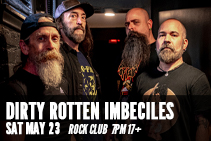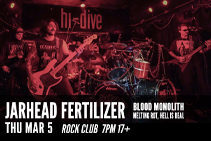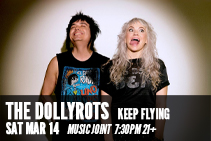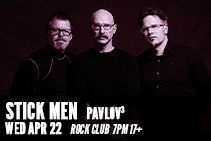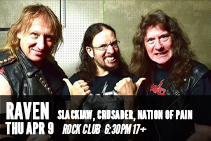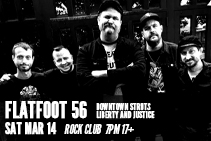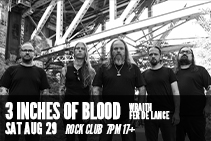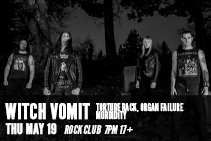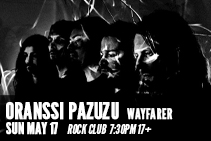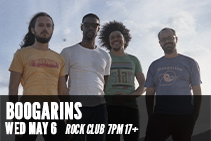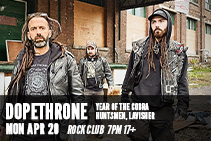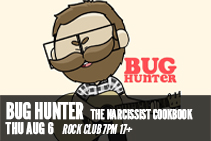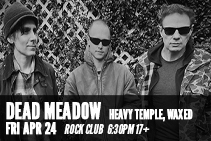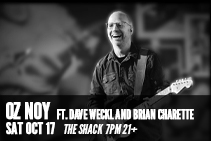VIP meet & greet is 1 hour prior to doors

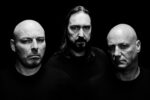
CORONER
Coroner – the artisans of thrash metal
Playful, yet full of raw power; delicate and brutal at the same time; driving rhythms coupled with dizzying guitar solos … Coroner is all this and more. Is it thrash metal? Is it speed metal? Is it technical death metal? This Swiss band cannot be pigeonholed. It is unique … even after 30 years on the go.
The early 1980s was a tumultuous time in Zurich. This usually oh-so-quiet city on the River Limmat was seething with unrest. It was a time of protest marches and riots. Young people were fighting for the freedom and space to express themselves. The atmosphere was highly charged. It was against this backdrop that two bands emerged from the small Zurich metal scene determined to conquer the world: Coroner and Celtic Frost. They were hungry for new, fresh, original music, and decided to make it themselves.
Back then, the Coroner line-up was Tommy Vetterli aka Tommy T. Baron (guitar), Marky Edelmann aka Marquis Marky (drums), and Ron Broder aka Ron Royce (bass). The vocals on the band’s first demo tape (Death Cult) were provided by Tom G. Warrior of Celtic Frost. This was before Ron became the band’s vocalist.
Death Cult got Coroner a record deal with the German label Noise Records, which was at the time a force to be reckoned with when it came to discovering exciting new metal bands. The five studio albums Coroner made with Noise Records proved that it was so much more than a run-of-the-mill thrash metal band: R.I.P (1987) was unpolished high-speed metal, Punishment for Decadence (1988) was musically complex, No More Color (1989) and Mental Vortex (1991) demonstrated the band’s technically maturity, while Grin (1993) marked a shift towards a more straightforward sound with drive. Coroner also proved their mettle on stage with tours of Europe and the USA.
Coroner’s brand of metal is all about complex rhythms and intricate melodies coupled with outstanding technique. The band’s music is driven by Ron’s accurate bass sequences, which push his instrument to the limit of what is possible, and Marky’s drum patterns, that just cannot stick to the straight-and-narrow of four-four time. All of this underpins Tommy’s virtuoso guitar sequences, razor-sharp masterpieces with a neoclassical touch that earned him a reputation as one of the world’s best metal guitarists.
But this uniqueness was also a liability: the band was often underrated; most metal fans had no time for the artistic complexity of Coroner’s music. Tension arose between the band members. Their perfectionism and the resurgence of a desire to explore other musical styles drove the three men apart.
Coroner split after one last tour in 1996. They may not have performed with each other for 15 years, but they certainly were not inactive. Tommy Vetterli toured with Swiss pop star Stephan Eicher and
became a member of the German metal band Kreator. Marky joined Tom G. Warrior’s project Apollyon Sun and experimented with electronic music. Ron withdrew from the metal scene, occasionally playing bass in a variety of projects.
But the fans never forgot Coroner. In fact, the demand from concert organisers for Coroner to perform live again was so great in 2010 that it seemed the time was ripe for a reunion. Coroner went back into the rehearsal room and practiced their old songs with new vigour. What followed was a triumphant tour of the largest metal festivals on the planet: 30,000 people saw Coroner perform live at Hellfest in Clisson (France); Coroner also played Wacken in northern Germany, the Maryland Death Fest in Baltimore (USA), and Bloodstock Openair in England. To top it all, they even went on a musical cruise with 70,000 Tons of Metal. But it didn’t end there: they also played sell-out headliner shows in clubs right across Europe.
The trio was invigorated by its success. After three years and dozens of reunion concerts, Tommy Vetterli and Ron Broder were hungry: they wanted to write new songs and record a new album, 20 years after Grin. But Marky Edelmann was not on board. As far as he was concerned, his personal history with Coroner had come to a dignified end. After a farewell concert in Zurich, Marky left the band in February 2014 and was replaced by Diego Rapacchietti, drummer with 69 Chambers.
Autopsy and a new album: a legacy and a new beginning 2016 is the year of Coroner’s first release of the twenty-first century: Autopsy is a gift to fans packed with gems like a documentary on the history of the band, live footage from the reunion concerts, unpublished and rare archive material, as well as a best-of compilation. It is available as either a limited collector’s edition with 3 blu-ray discs and the compilation on vinyl with a signed gatefold cover or as a standard edition with three DVDs and a compilation CD.
In the spirit of an autopsy, the 100-minute documentary ‘Coroner – Rewind’ dissects the history of the band from 1985 to 2014. It begins with the early days of ‘Heavy Disco’ in the Zurich hinterland and covers everything that followed: the style-defining years at Noise Records, the band’s split, the reunion tour, and Marky Edelmann’s departure.
The documentary features previously unpublished archive material from the 80s and 90s: footage of the studio session where Celtic Frost singer Tom Warrior sang vocals for Coroner’s first demo, backstage footage from the reunion tour, and interviews with the band members, crew, fellow musicians, and contemporaries, including Tom G. Warrior and Martin Ain (Celtic Frost), Mille Petrozza (Kreator), Franz Treichler (Young Gods), Max Cavalera (Sepultura / Soulfly), Chrigel Glanzmann (Eluveitie), Stephan Eicher, Mikael Åkerfeldt (Opeth), and Chris von Rohr (Krokus).
All of them have one thing in common: they admire Coroner’s talent. Or, as Mikael Åkerfeldt of Opeth, puts it in the film: ‘Coroner taught me that playing hard and fast music doesn’t necessarily make you a crap musician. They showed me that it can be art at a very high level.’ For guitarist Tommy Vetterli, ‘Coroner – Rewind’ dug up some old memories: ‘For us, it’s like leafing through a family photo album: you relive all those moments, those highs and lows, all over again.’
The second Autopsy disc provides a cross-section of the reunion concerts from 2011 to 2014: live footage of 17 songs performed at Hellfest, the Maryland Death Fest, Bloodstock Openair, and other festivals and clubs. Autopsy also includes a number of treats in the form of videos of Coroner singles, a recording of the legendary ‘Thrashing East’ concert in East Berlin in 1990, rehearsal footage, and a snippet from Coroner’s very first concert in Zurich.
The future begins now: the new Coroner line-up with drummer Diego Rapacchietti has a record deal with Sony Music Switzerland and will release a new studio album in co-operation with Century Media in 2017. ‘In the 20 years since our farewell tour, we have matured musically,’ says Tommy Vetterli. ‘We now want to show what we can take from this experience in the form of new songs and new energy. We’re back. We really want this. And we’re ready for it.’
The results of the autopsy are in: Coroner is not dead. Coroner is very much alive.
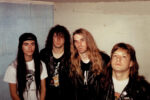
DECEASED
These Virginia-based death metalers started out in 1985 recording and circulating demos, slowly building their reputation. In 1988, original bassist Rob Sterzel was killed in a hit-and-run accident and replaced by Les Snyder. Together with guitarists Mark Adams and Mike Smith and drummer/vocalist King Fowley, Deceased became the first band to be signed to Relapse records. The single Gutwrench was released in 1991 followed by their 1992 debut album Luck of the Corpse. Less than a year later they released The 13 Frightened Souls a five-song EP that covers a wide spectrum of death, speed, and thrash metal styles. Deceased offered two more releases in 1995: Blueprints for Madness, a full-length studio album along with Death Metal from the Grave, a mix of early demos and live cuts released on Last World Records. 1997’s Fearless Undead Machines brought Deceased wide critical acclaim and was followed by another critical success, Supernatural Addiction. ~ Kevin Odle, Rovi
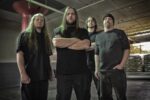
MORTA SKULD
Early in their career, Milwaukee, Wisconsin’s Morta Skuld accomplished the impressive feat of being signed by leading British independent metal label , but with no company showing similar interest in their homeland, they never quite managed to ascend beyond the underground death metal scene. Originally founded in 1989, Morta Skuld recorded and circulated two separate demos (1990’s Gory Departure and 1991’s Prolong the Agony) before pairing up with Rhode Island’s for a split single in 1993, which would duly get both bands signed to . Morta Skuld struck first, however, unleashing their Dying Remains debut later that same year and heading out on tour with genre fixtures like , , and , then repeating the pattern with 1994’s As Humanity Fades and 1995’s For All Eternity, which were followed by more rigorous roadwork in support of , , and others.
But, as mentioned earlier, none of these releases, though brimming with ably performed American death metal, made it into record stores unless imported from overseas, and so Morta Skuld’s frustrated members, Dave Gregor (vocals/guitar), Jason O’Connell (guitar), Jason Hellman (bass), and Kent Truckenbrod (drums), decided to link up with U.S.-based for the release of their fourth album, Surface, in 1998. Unfortunately, by then it was seemingly too late for the group, which was splitting at the seams. O’Connell was the first to bounce (or get bounced!), quickly followed by Truckenbrod, and after hiring a new drummer in former man Jason Mooney, the new trio renamed itself MS2 and sold out to nu metal before morphing yet again into a more groove-metal-oriented direction as , recording one EP and two albums in the late 2000s. The band’s early career dreams were compiled for posterity by in 2005’s Re-Surface: The Best of Morta Skuld, and in 2017 Morta Skuld resurfaced with founding member David Gregor (guitars/vocals), guitarist Scott Willecke, drummer Eric House, and bassist Al Lewandowski, and released their first collection of new music since 1997, Wounds Deeper Than Time. ~ Eduardo Rivadavia, Rovi
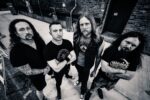
MISFIRE
MISFIRE makes old-school flavored thrash metal devastation with the kind of bombastic firepower that could wake the dead. In the tradition of classic metal projects before them, these Chicago boys are raw power, unleashing song after song of unrelenting fury. It’s music that could have arrived in the thrash golden age of 1986, when bands like Metallica, Megadeth, Slayer, Dark Angel, and Sodom delivered vital records. And yet MISFIRE is forward-thinking, injecting modern metal mastery into their brew for a powerful, timeless sound.
VIP add-on
$30 | Includes meet & greet and photo/autograph session and will include a VIP lanyard and autograph card. Takes place 1 hour prior to doors. Does Not Include GA Ticket.


